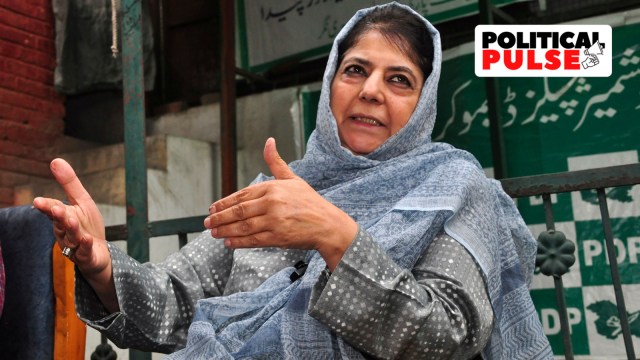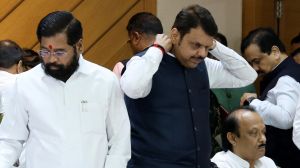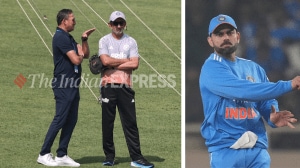In the 2014 Assembly elections, the Peoples Democratic Party (PDP) won 28 seats, emerged as the single largest party and went on to form the government in alliance with the BJP.
Ten years later, in the results announced Tuesday, the Mehbooba Mufti-led party has been routed in the Kashmir Valley, reduced to just three seats. Among the high-profile losses was that of Mufti’s daughter Iltija Mufti from Srigufwara-Bijbehara and Mufti’s uncle Sartaj Madni from Kulgam. Other senior leaders such as Abdul Rehman Veeri and Mehboob Beig lost from Anantnag East and Anantnag respectively.

This is the PDP’s worst electoral performance since it was founded in 1999 by Mufti Mohammad Sayeed. In its first electoral battle in 2002, the party had secured 16 seats, while in 2008, the party won 21 seats. 2014 was its best showing ever, with 28 seats.
As the results became clear Tuesday, Mufti conceded defeat and congratulated the people of Jammu and Kashmir for “voting for a stable government”. As of 5 pm, the Jammu Kashmir National Conference (JKNC) led by Farooq Abdullah was leading or winning in 42 of the 90 seats in the Union Territory.
“The people have voted wisely, they have voted for a stable government,” Mufti said in Srinagar, adding: “I am happy that the mandate is not divided. They did not leave any chance for manipulation. The people are in difficult times and they need a stable government.”
Mufti acknowledged that the PDP suffered a blow, but said it “is not out” from the picture. “We are still a force to reckon with,” she said.
The PDP won only Pulwama and Tral of the 16 seats in its South Kashmir bastion. In 2014, it had secured 11 of these seats. While PDP youth wing president Waheed ur Rehman Para won from Pulwama, Rafiq Naik secured the Tral seat. Those who worked on campaigns in the seats say the wins were more so because of the personal rapport and connection of the candidates with the voters than the PDP tag.
Story continues below this ad
The third seat the PDP won in the Valley was Kupwara, where its candidate Fayaz Ahmad Mir defeated NC provincial president Nasir Aslam Wani and Peoples Conference president Sajad Lone.
The root cause: the 2014 alliance
The post-poll alliance of 2014 was seen as a “betrayal”, leading to a new wave of anger and militancy, especially in the PDP’s South Kashmir bastion.
The handling of protests in 2016 that were triggered by the killing of militant commander Burhan Wani and the subsequent remark of Mufti, then the Chief Minister, that the boys “had not gone to buy toffee and milk” when they were killed did not go down well with the people.
The abrogation of Article 370 or the special status to Jammu and Kashmir in August 2019 by the BJP government at the Centre, and the PDP’s short-lived association with it, was the final nail in the coffin. Even though the partnership with the BJP ended before the scrapping of J&K’s special status, the PDP was partly blamed for it and resentment continued to grow.
Story continues below this ad
Several leaders also left the PDP after the abrogation of Article 370, leading to the weakening of the PDP cadre on the ground
Para told The Indian Express that there was another reason. “The BJP’s experiment of dividing the vote in Kashmir and attempting to make the government by hook or crook rallied people behind one party.”
Even NC vice-president Omar Abdullah, who is likely to become the next CM of J&K, expressed surprise at the results. Talking to reporters, he said voters had “given us votes even more than our expectations”.

































